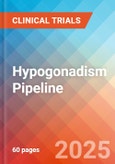Hypogonadism: Understanding
Hypogonadism: Overview
Hypogonadism occurs when your sex glands produce little or no sex hormones. The sex glands, also called gonads, are primarily the testes in men and the ovaries in women. Sex hormones help control secondary sex characteristics, such as breast development in women, testicular development in men, and pubic hair growth. Sex hormones also play a role in the menstrual cycle and sperm production. Hypogonadism may also be known as gonad deficiency. It may be called low serum testosterone or andropause when it happens in males. There are two types of Hypogonadism: primary and central. Primary Hypogonadism means that person don’t have enough sex hormones in the body due to a problem in their gonads. The gonads are still receiving the message to produce hormones from the brain, but they aren’t able to produce them. In central hypogonadism, the problem lies in the brain. The hypothalamus and pituitary gland, which control a person’s gonads, aren’t working properly. Symptoms that may appear in females include: lack of menstruation, slow or absent breast growth, hot flashes, loss of body hair, low or absent sex drive, milky discharge from breasts. Symptoms that may appear in males include: loss of body hair, muscle loss, abnormal breast growth, reduced growth of penis and testicles, erectile dysfunction, osteoporosis and many others. Unless it’s caused by a treatable condition, hypogonadism is a chronic condition that may require lifelong treatment. “Hypogonadism- Pipeline Insight, 2025' report outlays comprehensive insights of present scenario and growth prospects across the indication. A detailed picture of the Hypogonadism pipeline landscape is provided which includes the disease overview and Hypogonadism treatment guidelines. The assessment part of the report embraces, in depth Hypogonadism commercial assessment and clinical assessment of the pipeline products under development. In the report, detailed description of the drug is given which includes mechanism of action of the drug, clinical studies, NDA approvals (if any), and product development activities comprising the technology, Hypogonadism collaborations, licensing, mergers and acquisition, funding, designations and other product related details.Report Highlights
The companies and academics are working to assess challenges and seek opportunities that could influence Hypogonadism R&D. The therapies under development are focused on novel approaches to treat/improve Hypogonadism.Hypogonadism Emerging Drugs Chapters
This segment of the Hypogonadism report encloses its detailed analysis of various drugs in different stages of clinical development, including phase II, I, preclinical and Discovery. It also helps to understand clinical trial details, expressive pharmacological action, agreements and collaborations, and the latest news and press releases.Hypogonadism Emerging Drugs
CKD-845: Chong Kun Dang Pharmaceutical
An intramuscularly injected testosterone designated as CKD 845 is being developed by Chong Kun Dang Pharmaceutical for the treatment of hypogonadism.Leflutrozole: Mereo BioPharma
Leflutrozole (BGS649), is a novel once weekly oral aromatase inhibitor that has completed a Phase 2b study in obesity-associated male hypogonadotropic hypogonadism (HH).Hypogonadism: Therapeutic Assessment
This segment of the report provides insights about the different Hypogonadism drugs segregated based on following parameters that define the scope of the report, such as:Major Players in Hypogonadism
There are approx. 10+ key companies which are developing the therapies for Hypogonadism. The companies which have their Hypogonadism drug candidates in the most advanced stage, i.e. phase II include, Mereo BioPharma.Phases
The report covers around 10+ products under different phases of clinical development like
- Late stage products (Phase III)
- Mid-stage products (Phase II)
- Early-stage product (Phase I) along with the details of
- Pre-clinical and Discovery stage candidates
- Discontinued & Inactive candidates
Route of Administration
Hypogonadism pipeline report provides the therapeutic assessment of the pipeline drugs by the Route of Administration. Products have been categorized under various ROAs such as- Intra-articular
- Intraocular
- Intrathecal
- Intravenous
- Ophthalmic
- Oral
- Parenteral
- Subcutaneous
- Topical
- Transdermal
Molecule Type
Products have been categorized under various Molecule types such as
- Oligonucleotide
- Peptide
- Small molecule
Product Type
Drugs have been categorized under various product types like Mono, Combination and Mono/Combination.Hypogonadism: Pipeline Development Activities
The report provides insights into different therapeutic candidates in phase II, I, preclinical and discovery stage. It also analyses Hypogonadism therapeutic drugs key players involved in developing key drugs.Pipeline Development Activities
The report covers the detailed information of collaborations, acquisition and merger, licensing along with a thorough therapeutic assessment of emerging Hypogonadism drugs.Hypogonadism Report Insights
- Hypogonadism Pipeline Analysis
- Therapeutic Assessment
- Unmet Needs
- Impact of Drugs
Hypogonadism Report Assessment
- Pipeline Product Profiles
- Therapeutic Assessment
- Pipeline Assessment
- Inactive drugs assessment
- Unmet Needs
Key Questions
Current Treatment Scenario and Emerging Therapies:
- How many companies are developing Hypogonadism drugs?
- How many Hypogonadism drugs are developed by each company?
- How many emerging drugs are in mid-stage, and late-stage of development for the treatment of Hypogonadism?
- What are the key collaborations (Industry-Industry, Industry-Academia), Mergers and acquisitions, licensing activities related to the Hypogonadism therapeutics?
- What are the recent trends, drug types and novel technologies developed to overcome the limitation of existing therapies?
- What are the clinical studies going on for Hypogonadism and their status?
- What are the key designations that have been granted to the emerging drugs?
Key Players
- Chong Kun Dang Pharmaceutical
- Mereo BioPharma
- Merck & Co
- Organon
- Marius Pharmaceuticals
- SOV Therapeutics
Key Products
- CKD-845
- Leflutrozole
- Corifollitropin alfa
- SOV-2012-F1
This product will be delivered within 2 business days.
Table of Contents
Companies Mentioned (Partial List)
A selection of companies mentioned in this report includes, but is not limited to:
- Chong Kun Dang Pharmaceutical
- Mereo BioPharma
- Merck & Co
- Organon
- Marius Pharmaceuticals
- SOV Therapeutics








